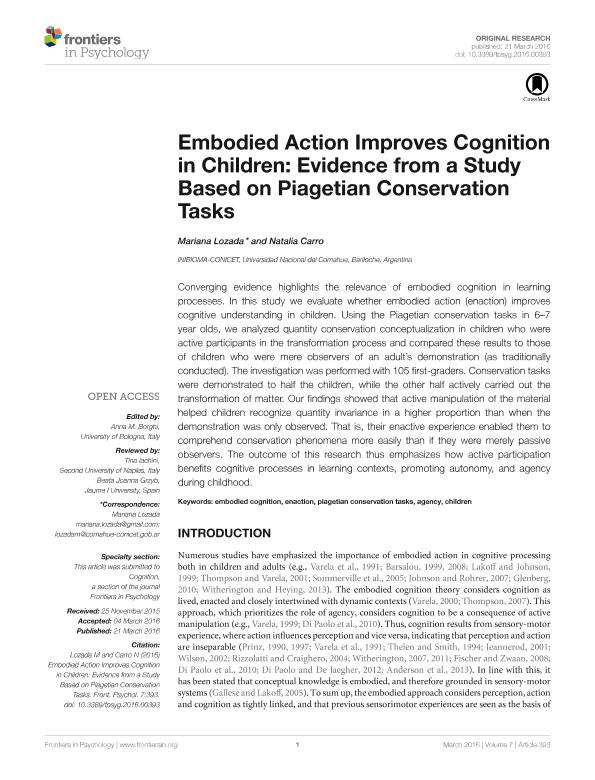Artículo
Embodied action improves cognition in children: Evidence from a study based on piagetian conservation tasks
Fecha de publicación:
03/2016
Editorial:
Frontiers Media S.A.
Revista:
Frontiers in Psychology
ISSN:
1664-1078
Idioma:
Inglés
Tipo de recurso:
Artículo publicado
Clasificación temática:
Resumen
Converging evidence highlights the relevance of embodied cognition in learning processes. In this study we evaluate whether embodied action (enaction) improves cognitive understanding in children. Using the Piagetian conservation tasks in 6-7 year olds, we analyzed quantity conservation conceptualization in children who were active participants in the transformation process and compared these results to those of children who were mere observers of an adult's demonstration (as traditionally conducted). The investigation was performed with 105 first-graders. Conservation tasks were demonstrated to half the children, while the other half actively carried out the transformation of matter. Our findings showed that active manipulation of the material helped children recognize quantity invariance in a higher proportion than when the demonstration was only observed. That is, their enactive experience enabled them to comprehend conservation phenomena more easily than if they were merely passive observers. The outcome of this research thus emphasizes how active participation benefits cognitive processes in learning contexts, promoting autonomy, and agency during childhood.
Palabras clave:
Agency
,
Children
,
Embodied Cognition
,
Enaction
,
Piagetian Conservation Tasks
Archivos asociados
Licencia
Identificadores
Colecciones
Articulos(INIBIOMA)
Articulos de INST. DE INVEST.EN BIODIVERSIDAD Y MEDIOAMBIENTE
Articulos de INST. DE INVEST.EN BIODIVERSIDAD Y MEDIOAMBIENTE
Citación
Lozada, Mariana; Carro Regalado, Natalia Denisse; Embodied action improves cognition in children: Evidence from a study based on piagetian conservation tasks; Frontiers Media S.A.; Frontiers in Psychology; 7; 3-2016; 1-7
Compartir
Altmétricas




